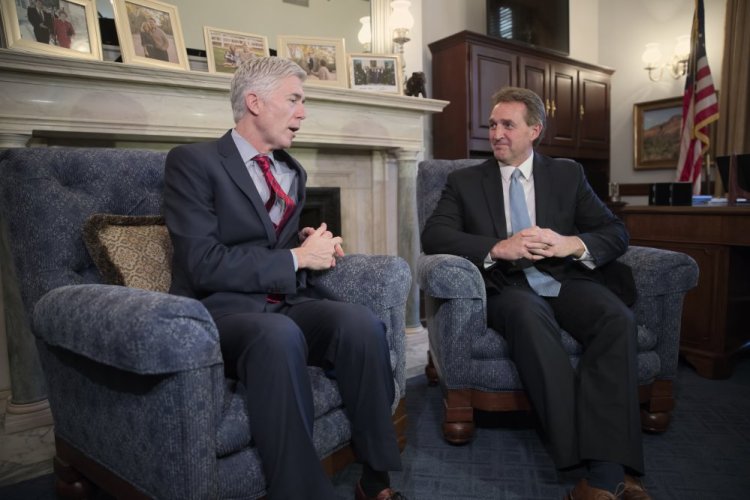President Trump’s escalating attacks on the judicial branch drew denunciation Wednesday from his Supreme Court nominee, Neil Gorsuch, who told lawmakers that the attacks are “demoralizing” and “disheartening” to the independence of the federal courts.
“He certainly expressed to me that he is disheartened by the demoralizing and abhorrent comments made by President Trump about the judiciary,” Sen. Richard Blumenthal, D-Conn., told reporters after meeting privately with Gorsuch.
Gorsuch’s comments to Blumenthal were confirmed by Ron Bonjean, a member of the judge’s “sherpa” team, a group of aides assigned to helping him navigate the confirmation process.
Earlier in the day, Trump continued his days-long crusade against the judicial branch, after a Seattle judge halted his controversial executive order barring immigration from seven predominantly Muslim countries.
Now, a three-judge panel in the 9th Circuit Court of Appeals is currently deliberating on whether Trump’s executive order should be allowed to continue.
Speaking at a convention of major city police chiefs, the president insinuated that the judicial branch has become too political, and that the decision before it on whether to allow his executive order to proceed is clear cut.
“If you were a good student in high school or a bad student in high school, you can understand this and it’s really incredible to me that we have a court case that’s going on so long,” Trump said before reading the federal statute that allows the president to restrict immigration for national security purposes.
“But courts seem to be so political and it would be so great for our justice system if they would be able to read a statement and do what’s right,” Trump added. “Right now, we are at risk because of what happened.”
Gorsuch public condemnation of Trump’s tone highlights the degree to which the issue had become an obstacle to his confirmation, especially given concern many Democrats already have about easily confirming Trump’s pick to the high court.
It is the latest in a days-long escalation of the dispute between the executive branch and the judiciary that the president has personally carried out on social media and on Wednesday, in his speech before the Major Cities Chiefs Association Winter Conference.
James Robart, a federal district court judge who initially stopped the implementation of Trump’s order, has also been the subject of angry tweets from the president, who called him a “so-called” judge.
And while it is not new for a president to disagree with the actions of another branch of government, Trump’s crusade against the federal judiciary comes before the legal process has fully played out.
White House Press Secretary Sean Spicer said that the president is expressing his frustration with the process that he believes should be subject to common sense.
“He respects the judiciary,” Spicer said. “It’s hard for him and for a lot of people to understand how something so clear in the law can be so misinterpreted.”
He added that Trump, who has a long history of punching back against his opponents both political and personal, is also speaking directly to his supporters who are looking for him to aggressively deliver on his campaign promises.
“He likes to talk to his supporters, to be blunt,” Spicer added. “Part of it is that people wonder, who helped elect him, what is he doing to enact his agenda.”
Trump’s handling of the incident recalled his attacks during the presidential campaign on an American judge of Mexican descent who he claimed could not fairly adjudicate his case because of his heritage.
“In Trump’s world there’s a precedent where he believes a judge of Mexican heritage can’t fairly judge his case,” said longtime Republican strategist Rick Wilson. “It’s part of the overall pattern of the Trump White House: They want to always be on the attack. It’s not enough to say their ideas are wrong their policies are wrong, you’ve got to nuke them.”
Not everyone was terribly offended by Trump’s words. Paul Cassell, a University of Utah law professor who served as a federal district judge from 2002 to 2007, who nominated by President George W. Bush said he believes Trump “stepped over the line” in his criticism of Robart.
“But I would characterize it as a misdemeanor traffic ticket, not a felony,” Cassell said. “Judges have thick-enough skins that they are used to being criticized. We live in a time in which strong language seems to be the order of the day.”
“The president certainly has a right to criticize the court,” Cassell said.
He thought President Obama went further in his 2010 State of the Union criticism of the Supreme Court, which had just decided the Citizens United v Federal Election Commission case. Cassell said Obama used “more elegant language,” but also contends Obama’s analysis of the case was off-base.
Besides, “the president can tweet all he wants, but the final decision will be made by the judiciary.”
Send questions/comments to the editors.



Success. Please wait for the page to reload. If the page does not reload within 5 seconds, please refresh the page.
Enter your email and password to access comments.
Hi, to comment on stories you must . This profile is in addition to your subscription and website login.
Already have a commenting profile? .
Invalid username/password.
Please check your email to confirm and complete your registration.
Only subscribers are eligible to post comments. Please subscribe or login first for digital access. Here’s why.
Use the form below to reset your password. When you've submitted your account email, we will send an email with a reset code.